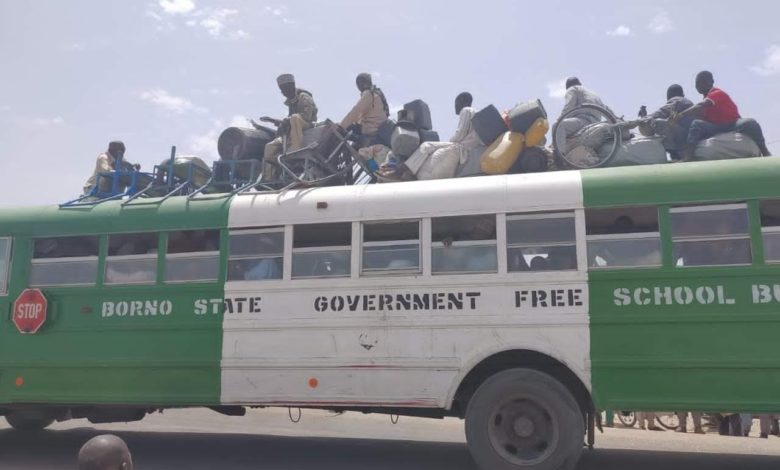Borno Gov’t Continues Relocation Of Displaced Persons
Borno State Government, Northeast Nigeria, has relocated over 2,000 displaced households from public facilities in Maiduguri.

Authorities in Borno State, Northeast Nigeria have relocated over 2,000 displaced households from public facilities in Maiduguri, as the government also returns more people to Marte close to Lake Chad.
According to a report from the United Nations Office for the Coordination of Humanitarian Affairs (OCHA), the Borno State Government (BSG) on May 31 concluded the relocation of over 2,000 IDP households from NYSC and MOGOLIS camps in Maiduguri, the capital of Borno.
“The relocations were planned and implemented by the BSG to return public facilities to their original purposes, such as schools and classrooms,” the report stated.
“In line with options provided by [the] government, some of the affected Internally displaced person (IDPs) moved to renovated houses in Auno community, others returned to Damasak town, their original community from where they were displaced years ago, and some opted to settle in Maiduguri with cash support from the BSG to rent homes.”
It also revealed that due to recent severe weather, some of the renovated houses in Auno have already experienced significant damage to infrastructure, less than one week after IDPs relocated there.
Authorities were reported to have also commenced relocations of some 500 IDP households from Monguno Local Government Area camps to Marte Local Government on the shores of Lake Chad, “where attacks by NSAGs and clashes with government forces have escalated since mid-February.”
Monguno is a major garrison town in northern Borno that hosts displaced persons, humanitarian actors, and facilities.
“Further clarity on these and future relocations is needed, requiring the coordination and involvement of both the state government and humanitarians, to ensure safe, dignified and informed resettlements for IDPs and that essential services and/or humanitarian access to these new areas is not an issue.”
OCHA highlighted that Marte Local Government has never been accessible to international aid agencies due to heightened insecurity.
“Similar relocations of civilians to Marte LGA in December were followed by NSAG attacks and clashes that forced over 3,000 IDP returnees to flee to neighbouring Dikwa LGA between February and March,” the report said.
The security condition in Marte, an important agricultural town close to Lake Chad remains volatile. In May, a Nigerian military convoy suffered casualties when the team encountered a buried improvised explosive device.
The UN aid organisation lamented that worsening insecurity, marked by a spate of attacks and clashes with government forces, continues to impact ongoing aid operations across local government areas of Borno State, especially in the northern axis.
“Operations in Mobbar (Damasak town) and Dikwa LGAs have been limited to critical life-saving response sustained through third parties/community-based actors since mid-April and humanitarian footprints remain low across some locations including Ngala, Monguno and Damboa LGAs due to heightened risks of violence.”
The Borno State Government is facilitating the return and resettlement of persons to their communities.
HumAngle understands that this will assist in decongesting camps and allowing returnees to engage in economic activities such as crop farming, fishing, and trading
In August 2020, insurgents targeted Kukawa towns after over 1,200 people returned.
In September, the government resettled at least 1,000 displaced persons in the fishing town of Baga on the shores of Lake Chad in Kukawa Local Government.
Kukawa Local Government is considered a high-security risk and this prevents humanitarian operations in the area.
Support Our Journalism
There are millions of ordinary people affected by conflict in Africa whose stories are missing in the mainstream media. HumAngle is determined to tell those challenging and under-reported stories, hoping that the people impacted by these conflicts will find the safety and security they deserve.
To ensure that we continue to provide public service coverage, we have a small favour to ask you. We want you to be part of our journalistic endeavour by contributing a token to us.
Your donation will further promote a robust, free, and independent media.
Donate HereStay Closer To The Stories That Matter




